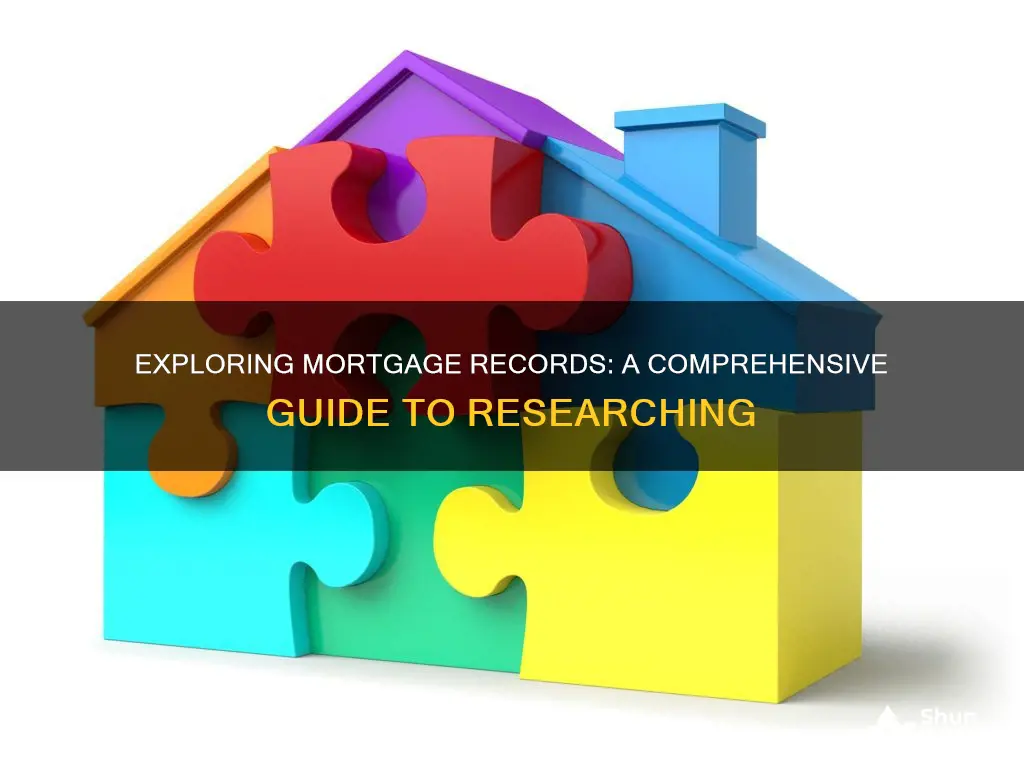
When shopping for a home, it is important to conduct thorough research to inform your offer. Public mortgage records are a great way to learn more about a property and its owner. These records are easily accessible to the public and can be found through real estate sites or the county office. To conduct a search, you will need basic information such as the property address or the owner's name. This guide will take you through the process of researching mortgage records, including where to find them and how to utilise the information effectively.
| Characteristics | Values |
|---|---|
| When to search | Soon after the homeowner closes a mortgage |
| Where to search | County clerk's office, county recorder's office, or online |
| What you need | Property address, owner's name, or other identifying information |
| What you'll find | Mortgage amount, property's legal description, address, lender, and other information |
| Why search | To determine a fair offer, to find out about the owner's situation, and to leverage information to get a better price |
What You'll Learn

Where to find mortgage records
When shopping for a home, it is important to do as much research as possible before presenting an offer. This includes locating a copy of the home's current mortgage records. Since this information is public, you have the right to access it. The process may take up some time but knowing how much the current homeowner still owes on their mortgage can help you make an offer that will not only save you money but will also increase the likelihood that your offer is accepted.
To conduct a mortgage record search, you will need basic information such as the property address or the owner's name. The property address can be found on the sales listing page, while you may need to ask your real estate agent to call the listing agent to obtain the owner's name. If you only need basic information or are in a hurry, you can do a quick check on major real estate sites such as Realtor.com, Zillow, or Trulia, which display property and tax history, including when the home was put up for sale, price changes, property taxes, and the property's total assessed value.
Mortgage records are filed with the county in which the property is located. You can access these records by visiting the county's public records or clerk's office in person or by checking their website to see if an online search can be conducted. Some counties, such as Camden County, offer the option to perform a basic search for free or pay a small fee for premium access, which includes additional features such as the ability to check the status of all documents submitted for recording and the option to print documents without a watermark. Once you have obtained the documents, it is recommended to consult a real estate agent to help you understand the figures and make an informed offer.
Public mortgage records can provide valuable information about a home and its owner, including the mortgage amount, sales and tax history, and how often the property has been listed for sale. This information can be used to make a competitive offer during the bidding process, especially for foreclosed homes. Additionally, mortgage records can offer insights into the seller's motivation to sell, such as divorce or frequent removal and relisting of the property, which may indicate a willingness to accept a lower price.
Researching Mortgages: A Step-by-Step Guide to Getting Started
You may want to see also

What information is included in mortgage records
Mortgage records are public information that can be accessed by anyone. They are filed with the county in which the property is located and can be accessed through the county's public records or clerk's office, either in person or online. Some towns maintain these records themselves.
Mortgage records contain a wealth of information about a property and its owners. They include the property's legal description, address, lender, mortgage amount, and other related information. They also show how much the owner borrowed on the property and how often it has been listed for sale. This information can be useful for prospective buyers as it can help them decide how much to offer on the property.
Additionally, mortgage records can reveal if the property has been removed from the market and then relisted, which could indicate potential issues with the house or the owner's motivation to sell. They also show when the lender transfers the mortgage to another lending company. Mortgage records can provide insights into the current owners' motivations and help determine the current value of the property.
To conduct a mortgage record search, you will need basic information such as the property address or the owner's name. This information can be obtained from the sales listing page or by contacting the listing agent through a real estate agent. Major real estate websites like Realtor.com, Zillow, and Trulia provide property and tax history, including sales prices, price changes, taxes, and assessed values.
Releasing a Recorded Mortgage in New Jersey
You may want to see also

How to access mortgage records
Mortgage records are a matter of public record and can be accessed by anyone. They can provide valuable information about a property and its owner, such as how motivated the owner may be to sell. This can be useful for prospective buyers who want to make a competitive offer.
Steps to Accessing Mortgage Records
- Obtain Information About the Homeowner and Property: Start by gathering basic information about the homeowner, such as their name and the property's address. This information is usually available on the sales listing page or through a real estate agent.
- Identify the County and State: Determine the county and state where the property is located. This is important because mortgage records are typically maintained by the county or state recorder's office.
- Locate the Recorder's Office: Find out where the county or state keeps its records. In some cases, mortgage records may be held in the courthouse or clerk's office. Alternatively, the town itself may handle the documents.
- Access the Records: Visit the website of the office that maintains the records. You may be able to search and view the records online by filling out a form and providing the required information. However, some offices may require you to visit in person to access the records. There may be a small fee associated with accessing the records.
- Understand the Records: Mortgage records can include a variety of information, such as the property's legal description, address, lender, mortgage amount, and other relevant details. If you are working with a real estate agent, they can help you interpret the figures and make an informed offer on the property.
It is important to note that each state has different laws, known as "recording statutes," regarding home deeds and mortgage documents. These laws dictate the specific requirements and processes for accessing mortgage records in that particular state.
Reporting Mortgage Insurance Premiums: A Comprehensive Guide
You may want to see also

The difference between a mortgage and a promissory note
When buying a home, most people sign two primary documents: a mortgage (or deed of trust) and a promissory note. However, these two documents are not the same. Here are the key differences between a mortgage and a promissory note:
The Purpose of the Document
A mortgage creates a security interest in the property (a lien) for the lender. It is a loan secured by real property, such as land or buildings, ensuring that lenders have a tangible asset to fall back on. The mortgage gives the lender the right to sell the property through foreclosure and use the proceeds to recoup its money if the borrower fails to make the loan payments.
On the other hand, a promissory note serves as the borrower's written promise to repay the debt. It is a financial instrument that contains a written and signed promise between two parties to repay a sum of money in exchange for a loan or other financing. The promissory note designates who is legally responsible for paying back the loan, along with laying out the payback plan and interest rates.
The Contents of the Document
The mortgage describes what happens to the home if the borrower doesn't make the payments, the lender's rights regarding the home, and the borrower's responsibilities for the property. It contains a legal description of the property and usually notes that the borrower is responsible for things like maintenance and carrying homeowners' insurance.
The promissory note, on the other hand, describes the loan terms, including the interest rate and repayment schedule. It includes the loan terms, such as the interest rate (fixed or adjustable), the late charge amount, the amount of the loan, and the term (number of years).
Recording and Enforcement
The mortgage is recorded in the county land records and can be enforced through foreclosure. The promissory note, however, is not recorded in the county land records. Instead, it is kept with the lender. The note gives the lender the right to collect on the loan if the borrower doesn't make payments, and it can be enforced through a lien, foreclosure, or eviction.
Security
The mortgage provides security (collateral) for the loan, with the property serving as collateral. This means that if the borrower defaults, the lender can take possession of the property through foreclosure.
Promissory notes, on the other hand, may not always offer such security. They can be either secured or unsecured, depending on the agreement between the lender and the borrower. Without a lien on an asset, the options for recourse are limited if borrowers default.
Mortgage Fraud: Reporting and Protecting Your Finances
You may want to see also

How to use mortgage records to your advantage when buying a home
When buying a home, it's important to do your research to ensure you're getting a good deal. One way to do this is by accessing and reviewing mortgage records. These are filed with the county the property resides in and become part of the public record soon after the homeowner closes the mortgage. You can access these records by visiting the relevant county office in person or checking their website.
Mortgage records can provide valuable insights into the property and its owners. For example, you can learn how much the current owners borrowed, which can help you determine how much to offer. You can also see how often the property has been listed for sale, which may indicate the owner's motivation to sell. If the property has been listed multiple times, it could suggest that the owner is willing to accept a lower price. Additionally, mortgage records can show if the mortgage has been transferred to another lending company, which can be important information for prospective buyers.
To conduct a mortgage record search, you'll need basic information such as the property address or the owner's name. You can then use this information to search through real estate websites or county clerk or public records offices. Some counties may also have dedicated search systems with basic and premium access options. While basic access may be free, premium access may offer additional features such as checking the status of all documents and printing documents without watermarks.
Once you've accessed the mortgage records, it's a good idea to review them with a real estate agent. They can help you understand the figures and use the information to craft a competitive offer. By leveraging mortgage records, you can make a more informed decision about the property and increase the likelihood of your offer being accepted. Remember that each state has different laws regarding home deeds and mortgage documents, so be sure to review the specific requirements for the state where the property is located.
Removing a Name from a Joint Mortgage: A Step-by-Step Guide
You may want to see also
Frequently asked questions
You can start by obtaining basic information about the property and its owner. This includes the property address, which can be found on the sales listing page, or the owner's name, which you can ask your real estate agent to find out for you. Once you have this information, you can search for the property's mortgage records through real estate websites and county clerk or public records offices.
You will need to know what county the property is in, and where that county keeps its records. Some counties keep mortgage records in the courthouse or clerk's office, while in some cases, the town itself handles the document. You can then go to the website of the relevant office to access the records.
Mortgage records can include the property's legal description, address, lender, mortgage amount, and other information related to the property. They can also show how much the owner borrowed on the home, how often the property has been listed for sale, and when the lender transferred the mortgage to another lending company. This information can be useful when deciding how much to offer on a property.
You can access mortgage records by visiting the relevant county office in person or by checking their website to see if a search can be conducted online. Some websites, such as ACRIS, CourthouseDirect.com, and NETR Online, allow you to search for properties and their affiliated documents. Alternatively, you can ask a real estate agent to access the records on your behalf.







